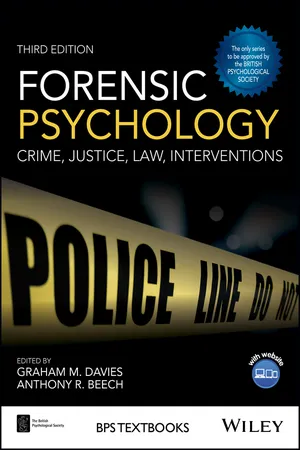
Forensic Psychology
Crime, Justice, Law, Interventions
- English
- ePUB (mobile friendly)
- Available on iOS & Android
Forensic Psychology
Crime, Justice, Law, Interventions
About this book
Introduces forensic psychology to students and professionals who want to better understand psychology's expanding influence on the study of law, crime and criminality
Forensic psychology is a constantly growing discipline, both in terms of student interest and as a profession for graduates. This book highlights the often sizeable gap between media myths surrounding forensic practice and reality. Editors Graham Davies and Anthony Beech present an exciting and broad range of topics within the field, including detailed treatments of the causes of crime, investigative methods, the trial process, and interventions with different types of offenders and offences.
Forensic Psychology: Crime, Justice, Law, Interventions, Third Edition covers every aspect of forensic psychology—from understanding criminal behaviour, to applying psychological theory to criminal investigation, analysing the legal process and the treatment of witnesses and offenders. Each chapter has been thoroughly revised and updated with the latest findings. The book also includes two entirely new chapters—one on psychopathy and crime, the other on female offenders. Drawing on a wealth of experience from leading researchers and practitioners, this new edition will interest and enthuse today's generation of students.
- All chapters thoroughly revised and updated
- Features two brand new chapters
- Supplemented by additional online resource materials, including related links, multiple choice questions, and PowerPoint slides
- Authored by a wide-range of experienced forensic psychology professionals
Forensic Psychology, Third Edition is essential reading for undergraduates' first encounter with the subject area and is an excellent introduction for more specialised postgraduate courses.
Frequently asked questions
- Essential is ideal for learners and professionals who enjoy exploring a wide range of subjects. Access the Essential Library with 800,000+ trusted titles and best-sellers across business, personal growth, and the humanities. Includes unlimited reading time and Standard Read Aloud voice.
- Complete: Perfect for advanced learners and researchers needing full, unrestricted access. Unlock 1.4M+ books across hundreds of subjects, including academic and specialized titles. The Complete Plan also includes advanced features like Premium Read Aloud and Research Assistant.
Please note we cannot support devices running on iOS 13 and Android 7 or earlier. Learn more about using the app.
Information
PART 1
The Causes of Crime
1 Psychological Approaches to Understanding Crime

CHAPTER OUTLINE
- 1.1 INTRODUCTION
- 1.2 PSYCHOLOGICAL THEORIES
- 1.2.1 Moral Reasoning Theory
- 1.2.2 Social Information-Processing Theory
- 1.3 THEORIES, EVIDENCE, AND CRIME
- 1.3.1 Interpersonal Violence
- 1.3.2 Sexual Offending
- 1.3.3 Arson
- 1.4 MENTALLY DISORDERED OFFENDERS
- 1.4.1 Why Are Mentally Disordered Offenders a Special Case?
- 1.4.2 Types of Mentally Disordered Offender
- 1.4.3 Psychopathy and Offending
- 1.5 CONCLUSIONS
- 1.6 SUMMARY
LEARNING OUTCOMES
- Recognise how psychological theories can assist us in understanding criminal behaviour
- Appreciate the different approaches to explaining violent, sexual and arson offences
- Understand how mental disorders such as schizophrenia, depression, learning disabilities and personality disorders are associated with criminal behaviour.
1.1 INTRODUCTION
1.2 PSYCHOLOGICAL THEORIES
1.2.1 Moral Reasoning Theory
| Immature moral reasoning | Mature moral reasoning | ||
| Stage 1: Unilateral and physicalistic | Stage 2: Exchanging and instrumental | Stage 3: Mutual and prosocial | Stage 4: Systemic and standard |
| Reasoning refers to powerful authority figures (e.g. parents) and the physical consequences of behaviour. Individuals show little or no perspective-taking. | Reasoning incorporates a basic understanding of social interaction. However, this is typically in terms of cost/benefit deals, with the benefits to the individual being of most importance. | Reasoning reflects an understanding of interpersonal relationship and the norms/expectations associated with these. Empathy and social perspective-taking are apparent, along with ideas appeals to one’s own conscience. | Reasoning reflects an understanding of complex social systems, with appeals to societal requirements, basic rights and values, and character/integrity. |
- Stage 1 – offender is morally justified if punishment can be avoided.
- Stage 2 – offender is morally justified if the benefits to the individual outweigh the costs.
- Stage 3 – offending is morally justified if it maintains personal relationships.
- Stage 4 – offending is morally justified if it maintains society or is sanctioned by a social institution.
Table of contents
- Cover
- fpraise
- Title Page
- Copyright
- dedication
- Contributors
- Preface to Third Edition
- About the Editors
- About the Companion Website
- Introduction
- PART 1 The Causes of Crime
- PART 2 Investigating Crime
- PART 3 the Trial Process
- PART 4 Dealing with Offenders
- Glossary
- Index
- EULA